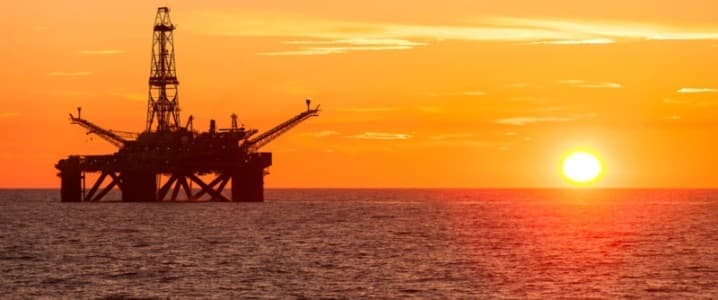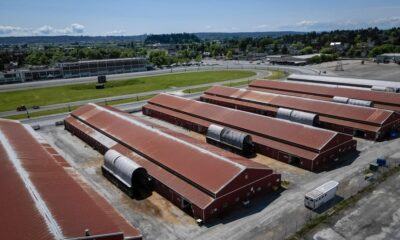Business
Suriname’s Oil Boom Gains Momentum Despite Economic Challenges

Suriname is on the brink of a significant oil boom, a development that could transform its struggling economy. For nearly a decade, the Surinamese government in Paramaribo has observed its neighbor, Guyana, successfully tapping into offshore oil reserves, elevating it to the status of a petrostate. Despite achieving positive results in offshore drilling, Suriname faced numerous delays and uncertainties that hindered its progress. As the nation grapples with an economic crisis exacerbated by the pandemic and austerity measures, the newly elected President, Jennifer Geerlings-Simons, aims to steer the country towards a more prosperous future.
The economic backdrop has been challenging. Suriname has been battling a severe financial crisis since early 2020, which intensified with violent protests in February 2023. These protests erupted following the implementation of austerity measures mandated by the International Monetary Fund (IMF), under then-President Chandrikapersad Santokhi. The measures included significant cuts to government spending, the removal of energy subsidies, and a sharp devaluation of the Suriname dollar. With nearly one-fifth of the population living below the poverty line, these policies met with considerable resistance.
Despite these hardships, some positive news emerged. In March 2025, the IMF reported that the objectives of its economic program had been largely met, noting a revival in growth, decreasing inflation, and declining public debt. However, the IMF also emphasized the need for Suriname to enforce strict fiscal discipline and enhance governance mechanisms. The political fallout from these austerity measures ultimately led to President Santokhi’s departure in July 2025.
The potential for an oil boom became apparent with significant discoveries in Block 58. The first discovery was made in January 2020 at the Maka Central-1 well, followed by four additional finds, culminating in the Krabdagu discovery in 2022. These discoveries have confirmed the presence of an estimated 750 million barrels of crude oil, characterized as light and sweet, making it suitable for producing high-quality fuels.
Originally, first oil from the block was anticipated in 2026. However, TotalEnergies delayed development due to poor exploration results and an inconsistent appraisal of the reserves. This led to a postponed final investment decision (FID) until October 2024, when TotalEnergies and APA announced a substantial $10.5 billion investment to develop the Sapakara and Krabdagu discoveries, with first oil now expected in 2028.
The GranMorgu project, situated 93 miles offshore from Paramaribo, will include one drillship and a semi-submersible rig, with a design capacity of 220,000 barrels of oil per day. It is expected to generate significant financial returns for the Surinamese government, potentially yielding between $16 billion and $26 billion over the oilfield’s lifespan. This revenue could dwarf Suriname’s current GDP of $4.46 billion, providing much-needed economic relief.
The environmental impact of the GranMorgu project is also notable. TotalEnergies aims for low carbon intensity in its operations, with forecasts indicating emissions of less than 16 kilograms of carbon per barrel of oil equivalent, a figure lower than the global average. The project aligns with TotalEnergies’ commitment to achieve net carbon neutrality by 2050. Additionally, the Surinamese government, through its national oil company Staatsolie, has secured a 20% interest in the GranMorgu project, valued at $2.4 billion.
As Suriname navigates the complexities of its economic landscape, the potential oil boom presents both challenges and opportunities. The success of the GranMorgu project could be a turning point for this resource-rich nation, which has long struggled with poverty and economic instability. The coming years will be critical as Suriname seeks to balance its economic needs with environmental responsibilities while striving for a more prosperous future.
-

 Science1 week ago
Science1 week agoMicrosoft Confirms U.S. Law Overrules Canadian Data Sovereignty
-

 Technology1 week ago
Technology1 week agoGoogle Pixel 10 Pro Fold Specs Unveiled Ahead of Launch
-

 Technology1 week ago
Technology1 week agoWorld of Warcraft Players Buzz Over 19-Quest Bee Challenge
-

 Science5 days ago
Science5 days agoChina’s Wukong Spacesuit Sets New Standard for AI in Space
-

 Health6 days ago
Health6 days agoRideau LRT Station Closed Following Fatal Cardiac Incident
-

 Science1 week ago
Science1 week agoXi Labs Innovates with New AI Operating System Set for 2025 Launch
-

 Lifestyle6 days ago
Lifestyle6 days agoVancouver’s Mini Mini Market Showcases Young Creatives
-

 Science1 week ago
Science1 week agoInfrastructure Overhaul Drives AI Integration at JPMorgan Chase
-

 Technology1 week ago
Technology1 week agoHumanoid Robots Compete in Hilarious Debut Games in Beijing
-

 Top Stories1 week ago
Top Stories1 week agoSurrey Ends Horse Racing at Fraser Downs for Major Redevelopment
-

 Technology5 days ago
Technology5 days agoDragon Ball: Sparking! Zero Launching on Switch and Switch 2 This November
-

 Technology1 week ago
Technology1 week agoNew IDR01 Smart Ring Offers Advanced Sports Tracking for $169
-

 Business6 days ago
Business6 days agoCanadian Stock Index Rises Slightly Amid Mixed U.S. Markets
-

 Health6 days ago
Health6 days agoB.C. Review Urges Changes in Rare-Disease Drug Funding System
-

 Science1 week ago
Science1 week agoNew Precision Approach to Treating Depression Tailors Care to Patients
-

 Technology1 week ago
Technology1 week agoGlobal Launch of Ragnarok M: Classic Set for September 3, 2025
-

 Technology1 week ago
Technology1 week agoFuture Entertainment Launches DDoD with Gameplay Trailer Showcase
-

 Education5 days ago
Education5 days agoParents Demand a Voice in Winnipeg’s Curriculum Changes
-

 Technology1 week ago
Technology1 week agoInnovative 140W GaN Travel Adapter Combines Power and Convenience
-

 Health5 days ago
Health5 days agoRideau LRT Station Closed Following Fatal Cardiac Arrest Incident
-

 Business1 week ago
Business1 week agoNew Estimates Reveal ChatGPT-5 Energy Use Could Soar
-

 Business5 days ago
Business5 days agoAir Canada and Flight Attendants Resume Negotiations Amid Ongoing Strike
-

 Health1 week ago
Health1 week agoGiant Boba and Unique Treats Take Center Stage at Ottawa’s Newest Bubble Tea Shop
-

 Business1 week ago
Business1 week agoSimons Plans Toronto Expansion as Retail Sector Shows Resilience










